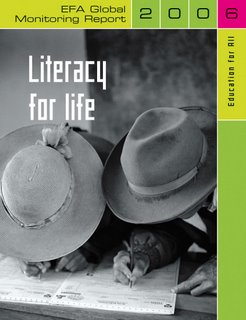
Read the full report online.
The 2006 report has just been published. The following is taken from UNESCO's media release on the report:
"Governments and donor countries are curtailing progress towards Education for All (EFA) – and broader poverty reduction – by according only marginal attention to the 771 million adults living without basic literacy skills, says the fourth edition of the EFA Global Monitoring Report, “Literacy for life”.* “Literacy is a right and a foundation for further learning that must be tackled through quality schooling for all children, vastly expanded literacy programmes for youth and adults, and policies to enrich the literate environment,” says Nicholas Burnett, the Report’s director.
"This three-fold strategy places literacy at the core of Education for All. It calls for measures to accelerate progress towards universal primary education, to scale up literacy programmes for youth and adults and to support libraries, the media, book publishing and access to information.
"'The powerful links that exist between adult literacy and better health, higher income, more active citizenship and children’s education should act as strong incentives for governments and donors to be much more proactive on addressing the literacy deficit,' says UNESCO’s Director-General Koïchiro Matsuura.
"According to the Report, three-quarters of the world’s adult illiterates live in 12 countries. South and West Asia has the lowest regional adult literacy rate (58.6%), followed by Sub-Saharan Africa (59.7%), and the Arab States (62.7%). Countries with the lowest adult literacy rates in the world are Burkina Faso (12.8%), Niger (14.4%) and Mali (19%).
"Reflecting deep-seated gender inequalities in many societies, women account for 64% of the adults worldwide who cannot read or write with understanding. This figure is virtually unchanged from 63% in 1990.
"Although adult literacy rates doubled in Sub-Saharan Africa, the Arab States and South and West Asia from 1970 to 2000, the rate of progress has slowed considerably since 1990. On present trends, only 86 percent of the world’s adults will be literate by 2015, up from 82 percent today.
"Severe poverty correlates strongly with low literacy rates: in Bangladesh, Ethiopia, Ghana, India, Mozambique and Nepal, where three-quarters or more of the population live on less than US$2 per day, adult literacy rates are below 63% and the number of illiterates exceeds 5 million.
"Driven by the expansion of schooling, the literacy rate for those aged between 15 and 24 in developing countries rose from 66% to 85% between 1970 and 2000-2004. Worldwide, however, more than 132 million people in this age group are still unable to read and write even at a minimum level."
No comments:
Post a Comment